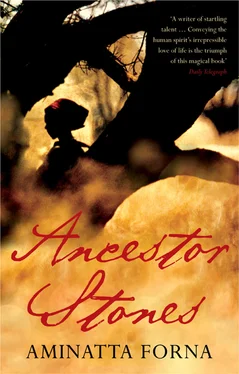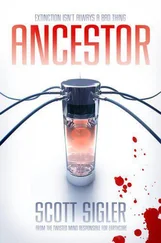Inside the house I shook Adama’s shoulder, we were alone, the two of us. I showed her what I’d seen. We did not sleep that night, we kept a vigil on the back verandah, watching the lights on the horizon.
Early prayers and the mosque was full, my neighbour stopped by with this news — for I had long given up going. Afterwards everybody wanted to talk about the omens in the night sky. At ten O’ clock my nephew came and pushed me to town in my barrow. Those days, the effort was far too much for Adama. Twice we had thought her labour was beginning, twice the birth attendant had been summoned. Both times it turned out to be a false alarm. Still, Kadie and Ansuman had delayed travelling to Guinea. In the end, though, Adama had urged her parents to go. Even if the baby came, we would manage.
Adama walked alongside me. The streets were quiet as we made our slow progress through them. In the square I noted half a dozen empty stalls among the regulars. No charcoal. Now, that was interesting. Charcoal was delivered from out of town first thing in the morning. I noticed one other thing, though I mentioned none of it to Adama — all the traders had already sold out of bread.
We opened up the shop, customers were scarce. A little after eleven Mr Wurie passed by with news of strangers sighted on the main road out of town. It was only a rumour, he told us quietly, but we ought to know. I thanked him for that and his offer to help us in any way he could.
At midday I closed up the shop. Other shop owners had already done the same. We spent a short time moving stock to the storeroom at the back. I took the money box and hid it under the stairs. Afterwards we pulled down the metal shutters and set off home.
Just two streets from the house, past the old railway station, there is a place where the wall of a house juts out and the road curves sharply around it. We turned the corner. On the road ahead of us I spotted Kamanda, the madman. He was wearing an old fisherman’s sweater and a pair of trousers with the seat torn out. Around his neck hung a necklace of bottle tops and crumpled drink cans. Kamanda’s face was running with sweat, he was babbling, spraying great gobs of spit. His calloused feet with their long, grey toenails stamped the earth as he marched up and down, up and down, swinging his arms.
‘Kamanda! Kamanda!’ I called. For he was a gentle soul. I had often given him the off cuts from reams of fabric, which he wrapped around his head or tucked into his belt like fluttering handkerchiefs. I had never seen him like this. I tried to calm him with my voice, but there was no reasoning with him at the best of times. For a few moments he seemed to settle, only to jump up, as if to attention, and begin striding up and down again.
At home I sent my nephew back to his house. ‘Hurry! No shilly shallying,’ I urged him. Then I busied Adama, telling her to bring the washing in, round up the chickens, and to light a fire.
While she was occupied I went around the house collecting up all my jewellery and precious things. From the suitcase under my bed I fetched the gifts I had bought for Adama’s baby, a silver coin with a hole in the middle and a gold chain to hang around the baby’s waist. Along with my most valuable pieces I tied them up in a cloth and dropped them into the water jar at the back door, then I sank a large stone on the top. The lesser pieces of jewellery I spread out on the table in the middle of the room.
Outside I loosened the tether of the goat and waved my stick at her until she bolted into the bushes. Afterwards I went to the yard and ordered Adama to bring the biggest of the cast iron pots and twelve cups of rice. Adama exclaimed upon the quantity, but did as she was told.
A lot of rice. Yes, indeed. I intended to cook enough to feed an army.
There was a town I used to visit. I had been there many times before. In that town was a factory which manufactured dyes and finishes. Every once in a while the owners produced a new range of colours and invited all their customers to view them. I always took the job of going to see the new range myself. Before I had my stroke it was something I liked to do. I liked the metallic tang in the air inside the main hall of the factory, the wooden vats of colour stirred by men with iron paddles, the smudges of colour on the walls. Mr Bangura, the foreman, was a cheerful fellow. A widower, whose wife had died of cholera, he had never remarried. On the third finger of his left hand he wore a ring. Not an ordinary wedding band, but a heavy gold signet ring engraved with two sets of initials. We always conducted our business upstairs in his office across a table holding many jars of pigment and glass tubes of colours. When our business was concluded he would serve me a cold drink out of the fridge behind his chair while we chatted about many things. Once he had joked that with our occupations we would make a good pair. And though I replied in a teasing voice that I was past all that, it occurred to me there was once a time when the idea would have not seemed such a bad one.
My visits to the factory also gave me a chance to see Alpha who worked nearby as a teacher’s assistant in a boy’s secondary school. He would cycle to meet me, carrying lunch for us both in aluminium pots wrapped up in cloths. We would share our meal, catch up on each other’s news and after I had rested a little and Alpha run whatever errands he had in town, we would set off to the factory, Alpha walking his bicycle, me alongside him.
The last time I visited, the heat had been dazzling, the sun directly overhead. The grass was pale yellow and bone dry, rustling in what little breeze there was. The great, black boulders scattered at the bottom of the hills glistened in the sun. The sky was hazy, streaked with clouds. It was too hot even for the birds, who hid from the heat in the branches of the trees. The factory was some small distance from the town. Despite the heat Alpha and I walked without stopping, lost in the pleasure of each other’s company.
There was no guard at the factory gate. We passed through, still chattering and we walked on up the empty drive. Mr Bangura didn’t hurry down to welcome me, or wave from his office window as he usually did. I noticed, yes. But did I think it so very strange? I don’t know, perhaps I only think so now.
The big factory door stood open. We stepped through. Inside the main hall, silent pools of colour. A paddle lying on the ground by my feet. Not a soul in sight.
For some reason we did not call out. We stood still and stared around us. Only a moment or two later did we open our ears and listen, and when we did we heard a sound that must have been there all along. A buzzing, like a faint whine, like an aeroplane engine high in the sky. We followed the sound across the factory floor towards the great, double doors that led out to the back, where deliveries came and went. On the opposite side was the storeroom where the tubs of pigment were kept.
One thing nobody ever mentions afterwards is the smell. The indignity of it, I suppose. Such a commonplace smell. One to make your mouth water and your stomach rumble. For the rest of your life at a family gathering, a festival, it will serve to bring back the nausea, return you to the horror.
What is it? It is the smell of roasted meat.
The roof of the storeroom was mostly gone, what remained had collapsed into the building. The windows were ringed with black, shards of darkened glass like broken teeth stuck out of the frames. On the ground below one window lay a tub, partly melted, the spilled violet powder a shock of colour. The door had turned to charcoal, and split apart as Alpha kicked it. The sound of buzzing soared. All around us briefly turned to black as we were engulfed by a great mass of flies. I covered my face and hit at them with my hands, and once the air cleared I saw what was inside.
Читать дальше












